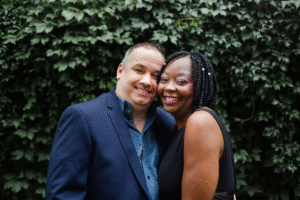
2 Simple Ways to Strengthen Your Relationship & Connection
2 Simple Ways to Strengthen Your Relationship
This Will Truly Help
2 Simple Ways to Strengthen Your Relationship
2 Simple Ways to Strengthen Your Relationship

2 Simple Ways to Strengthen Your Relationship
Strong relationships don’t happen by accident. They’re built through daily choices to show love, appreciation, and care for one another. When life gets busy with work demands, family responsibilities, and endless to-do lists, it’s easy to fall into autopilot mode with your partner. You might find yourself going through the motions without truly connecting or making them feel valued.
The good news? Making your partner feel good doesn’t require grand gestures or expensive gifts. Small, consistent actions can transform your relationship and reignite the emotional bond you share. These 2 simple strategies will help you create deeper connection and show your partner just how much they mean to you.
Express Verbal Appreciation
Words have incredible power to uplift and validate your partner. Yet many couples fall into the trap of focusing on what’s wrong rather than what’s going right. When did you last tell your partner something you genuinely appreciate about them?
Verbal appreciation goes beyond a simple “thank you.” It involves recognizing specific qualities, actions, or efforts your partner makes. Instead of saying “thanks for dinner,” try “I really appreciate how you took the time to cook my favorite meal after your long day at work. It shows how much you care about making me happy.”
Here are some meaningful ways to express appreciation:
Acknowledge their character: “I admire how patient you are with the kids, even when you’re stressed.”
Recognize their efforts: “I noticed how hard you’ve been working on that project. Your dedication inspires me.”
Appreciate their presence: “I feel so lucky to have someone who truly listens when I need to talk.”
The key to making verbal appreciation feel genuine is specificity and timing. Avoid generic compliments that could apply to anyone. Instead, focus on particular moments or qualities unique to your partner. Express these thoughts as they occur to you, rather than saving them for special occasions.
Be Considerate and Thoughtful
Consideration means thinking about your partner’s needs, preferences, and feelings in your daily decisions. It’s about showing up as a teammate rather than just a roommate sharing space.
Small acts of consideration can make your partner feel truly seen and cared for. This might mean bringing them coffee the way they like it, picking up their favorite snack at the store, or simply asking about their day and really listening to the answer.
Consider these thoughtful gestures:
Anticipate their needs: If you know they’ve had a stressful week, suggest ordering takeout instead of expecting them to cook.
Remember important details: Follow up on conversations about their work presentation, doctor’s appointment, or lunch with a friend.
Create comfort: Adjust the thermostat to their preferred temperature, queue up their favorite show, or give them space when they need to decompress.
Share responsibilities: Notice what needs to be done around the house and take initiative without being asked.
The secret to consistency lies in making consideration a habit rather than an occasional effort. Start by choosing one small way to be more thoughtful each day. Maybe it’s texting them during lunch to check how their morning went, or taking over a chore they typically handle without making a big announcement about it.
Pay attention to what makes your partner light up. Do they appreciate physical affection, quality time together, or acts of service? Everyone feels loved differently, so tailor your thoughtfulness to what resonates most with them.
Reconnect & Strengthen Your Bond
Making your partner feel good isn’t complicated, but it does require intention. These two approaches—expressing verbal appreciation, and being consistently considerate—create a foundation of love and respect that strengthens over time.
Start small. Choose one specific way to show appreciation today. Notice one thing you can do to be more thoughtful this week. These aren’t one-time fixes but ongoing practices that will transform how connected you feel as a couple.
Remember, healthy relationships thrive when both partners feel valued and supported. When you make the effort to make your partner feel good, you’re investing in the emotional bond that keeps your relationship strong through life’s inevitable challenges.
Your partner deserves to feel appreciated and loved. More importantly, your relationship deserves the attention and care that these simple practices provide. Take the first step today—your future selves will thank you for it.















